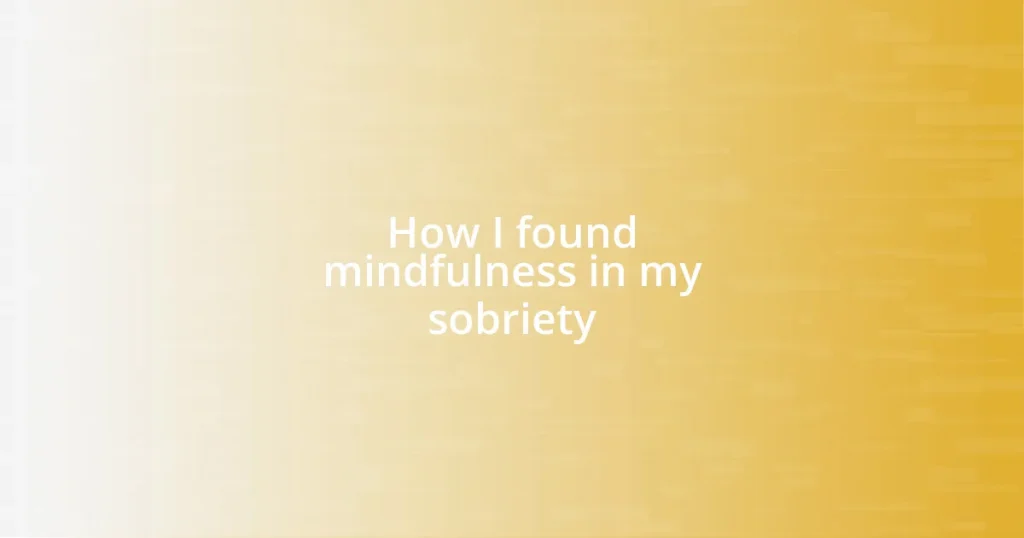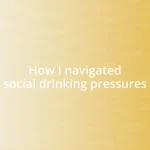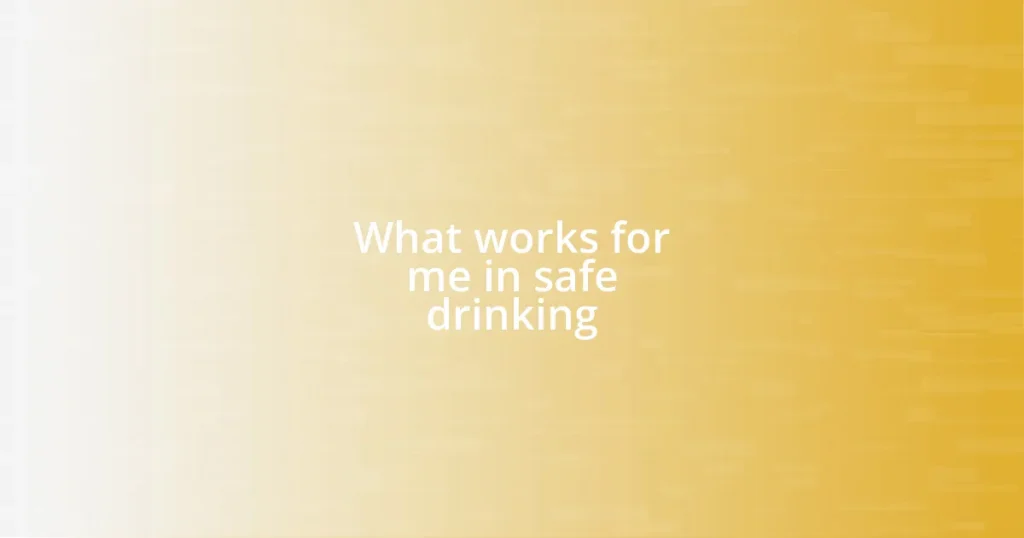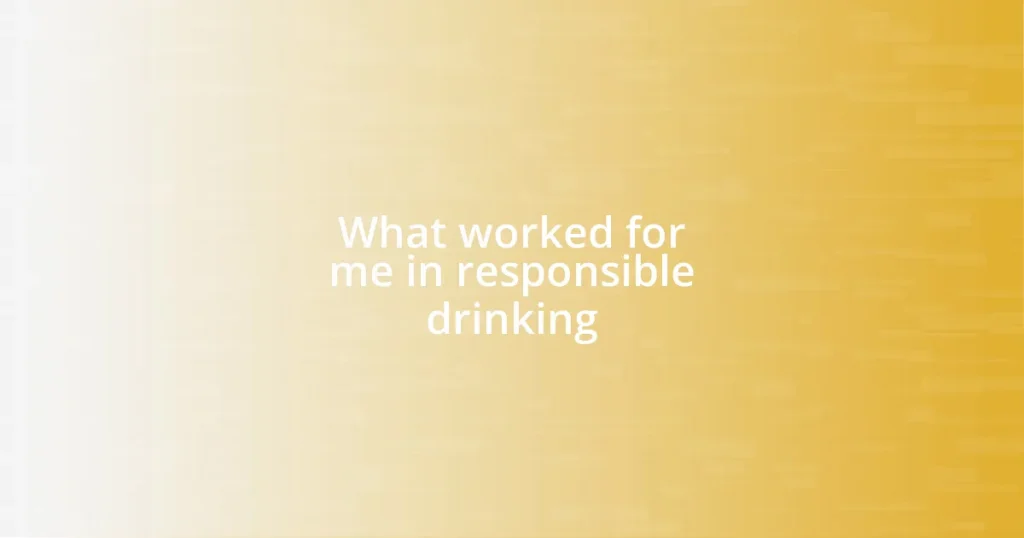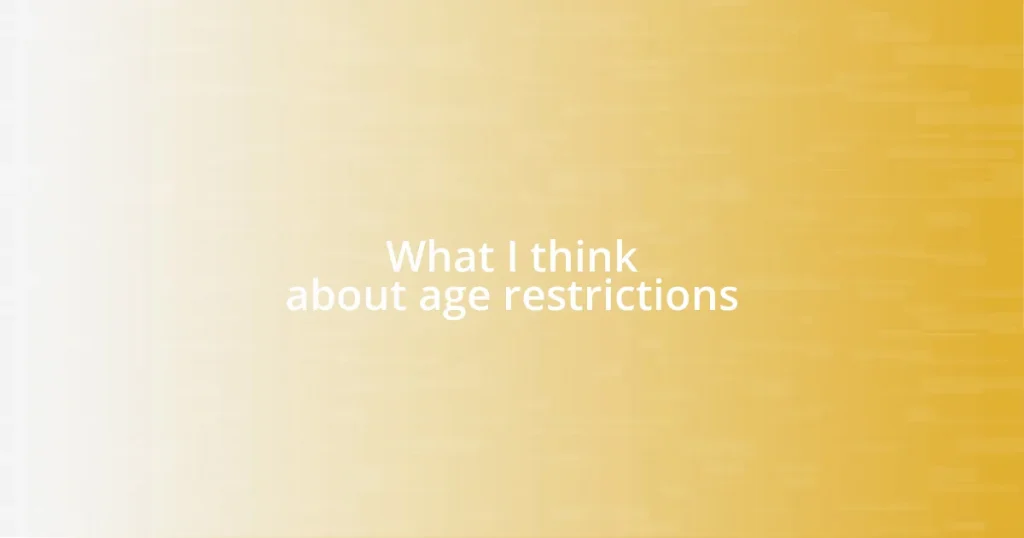Key takeaways:
- Mindfulness helped the author stay present and manage cravings during sobriety.
- The journey to sobriety involved confronting challenges such as self-doubt, cravings, and emotional rawness.
- Incorporating mindfulness practices, like breathing exercises and mindful walking, brought clarity and calm to the author’s recovery.
- Community support and adaptability in mindfulness techniques were crucial for sustaining long-term recovery.
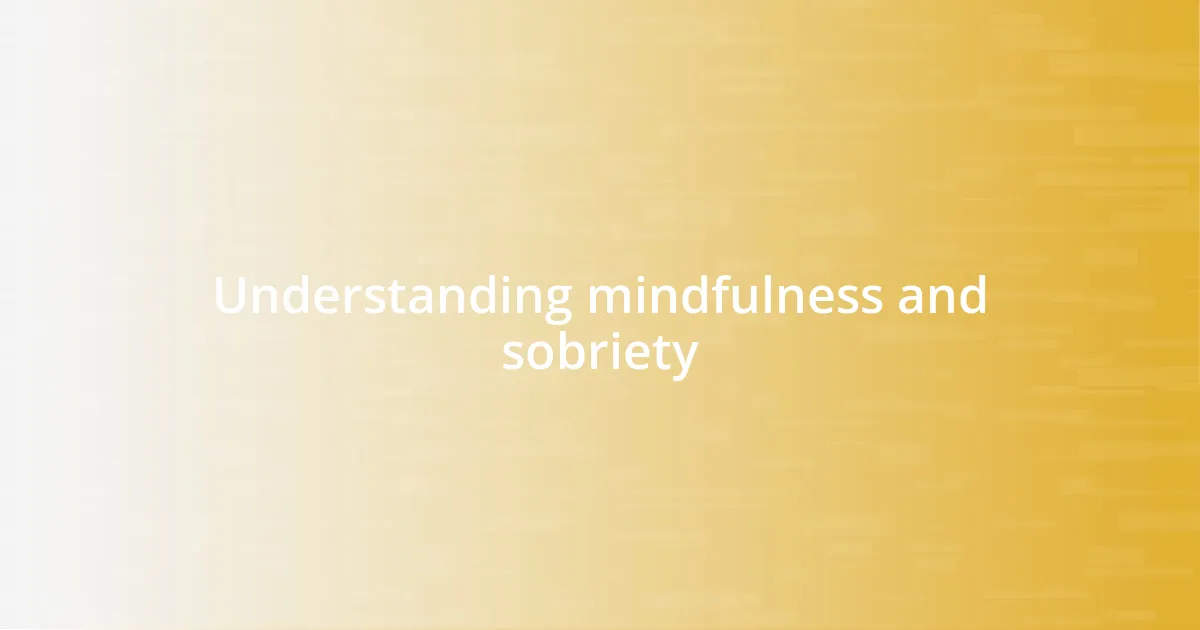
Understanding mindfulness and sobriety
Mindfulness and sobriety often go hand in hand. When I first embarked on my sobriety journey, I struggled to stay present, constantly haunted by past regrets or future anxieties. Have you ever found yourself caught in a loop of worry, unable to focus on the now? I certainly did, but learning mindfulness helped me shift my attention back to the moment.
In my experience, mindfulness is about embracing each thought and feeling without judgment. I remember sitting in silence, feeling the urge to reach for a drink, and instead of succumbing to it, I acknowledged the craving as just a passing cloud in my mind. This practice allowed me to observe my emotions rather than react impulsively, creating a space for more thoughtful choices.
Sometimes, it’s in those quiet moments of reflection that the true power of sobriety reveals itself. I notice how being sober allows me to experience joy and sadness in their purest forms. Have you ever felt that clarity when you’re completely in the moment? For me, this clarity not only deepens my understanding of myself, but also enhances my gratitude for everyday experiences.
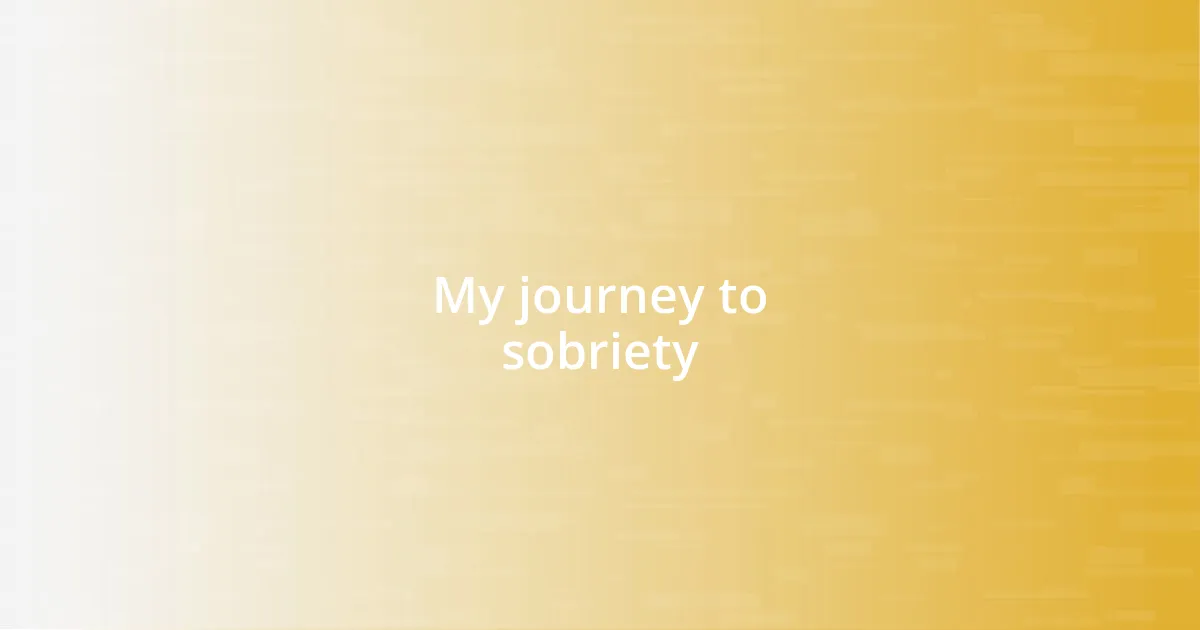
My journey to sobriety
My transition to sobriety was anything but smooth. Initially, I felt like I was living in a fog, with every day blending into the next. However, I remember the moment when I decided enough was enough: I was sitting alone in my apartment, surrounded by empty bottles, and it hit me that I had lost sight of who I truly was. That realization sparked a determination in me to change my life.
As I moved forward, I confronted the darkness of my habits and learned to embrace vulnerability. I recall a particularly challenging evening where I was surrounded by friends who were drinking. Instead of shying away or feeling resentful, I chose to stay present, engaging fully in their laughter, which was both liberating and healing. I began realizing that sobriety wasn’t just about abstaining from substances; it was about rebuilding connections and finding strength in authenticity.
Looking back, I can see how essential that journey was for my emotional health. I often reflect on how sobriety transformed my social landscape. Instead of feeling isolated, I discovered a new sense of belonging among those who shared similar values. This shift not only enriched my relationships but also opened doors to new experiences that I had previously missed, feelings of joy and support that were completely transformative.
| Key Aspects | My Journey |
|---|---|
| Initial Struggles | Living in a fog, plagued by loneliness |
| Moment of Change | Realizing I lost sight of my true self |
| Embracing Vulnerability | Staying present during challenging social situations |
| Community and Belonging | Finding support among like-minded individuals |
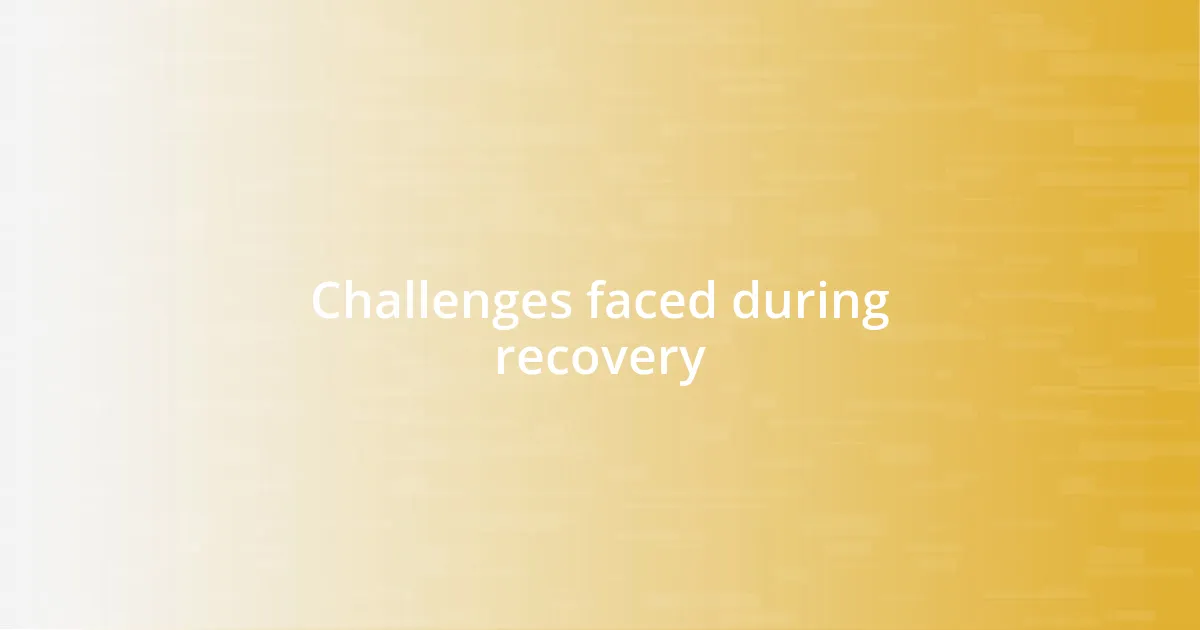
Challenges faced during recovery
Recovery isn’t a walk in the park. There were days when intrusive thoughts clawed at me, pulling me back into old habits. I remember a particularly difficult morning when I woke up anxious, staring at the ceiling, feeling trapped by my own mind. I longed for the escape that substances once offered. The struggle to differentiate between fleeting urges and genuine needs was real, often leaving me second-guessing myself and my progress.
Here are some of the challenges I faced during recovery:
- Cravings: Those sudden, intense desires that seemed to come from nowhere.
- Isolation: Feeling alone even when surrounded by people, a common experience I battled regularly.
- Triggers: Various situations or places that could ignite old habits, like a familiar bar or a specific friend group.
- Emotional Rawness: Experiencing heightened feelings of joy, sadness, or anger without any of the coping mechanisms I used before.
- Self-Doubt: Questioning my ability to maintain sobriety and feeling overwhelmed by the journey ahead.
Through all these challenges, I learned that being aware of my feelings was a crucial step. Mindfulness became my ally, allowing me to sit with discomfort rather than run from it. There’s something empowering in realizing that I could face these obstacles head-on instead of succumbing to the familiar habits that once defined me.
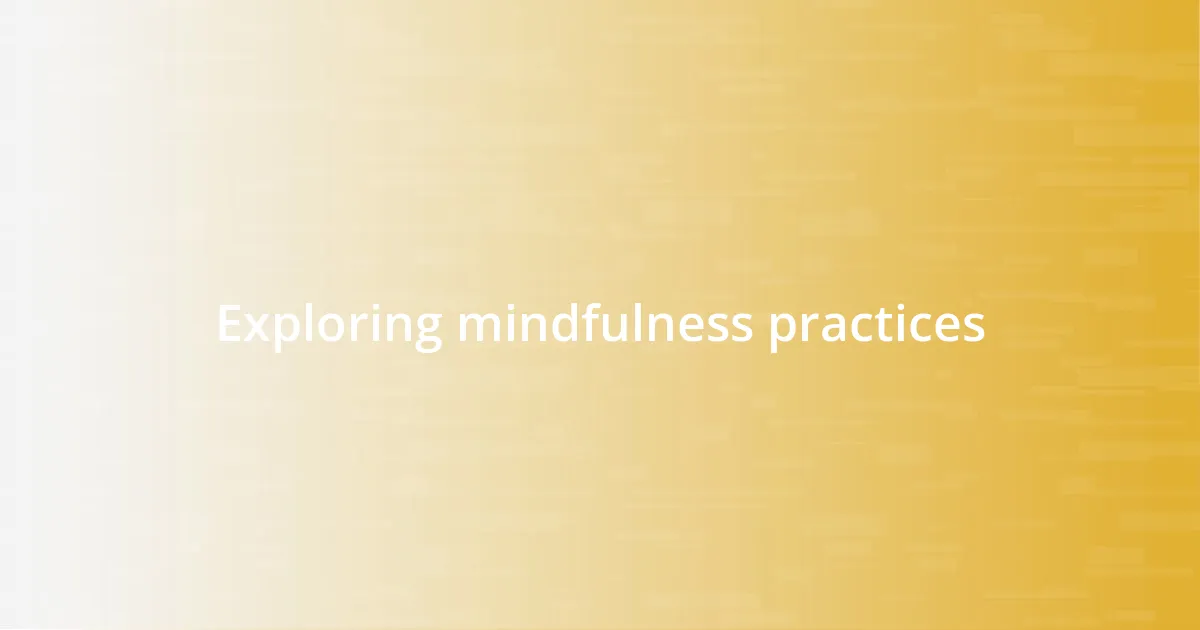
Exploring mindfulness practices
Practicing mindfulness was a game-changer for me, introducing a sense of calm during chaos. I remember when I first tried meditation; it felt foreign. Sitting still with my own thoughts was an uncomfortable challenge. But after a few tries, I discovered how grounding it could be. I sometimes asked myself, “What if I could find peace in this very moment?” That question ignited a spark, leading me to explore various mindfulness practices.
Breathing exercises quickly became my refuge. On particularly tough days, I’d close my eyes and focus solely on my breath. Inhale, hold, exhale. I felt the tension in my body release like air escaping a balloon. Those precious moments provided clarity and helped me respond to triggers with grace instead of reacting impulsively. It’s fascinating how something as simple as breathing can transform your perspective, isn’t it?
Incorporating mindful walking into my routine was another insightful step in my journey. I’d take strolls in nature, letting each step connect me with the earth. The leaves crunching underfoot became a soothing rhythm that anchored me. As I observed my surroundings—the sunlight filtering through the trees and the gentle rustle of branches—I felt truly alive and free. Have you ever noticed how nature can draw you into the present? That connection has nurtured my sobriety in ways I never imagined.
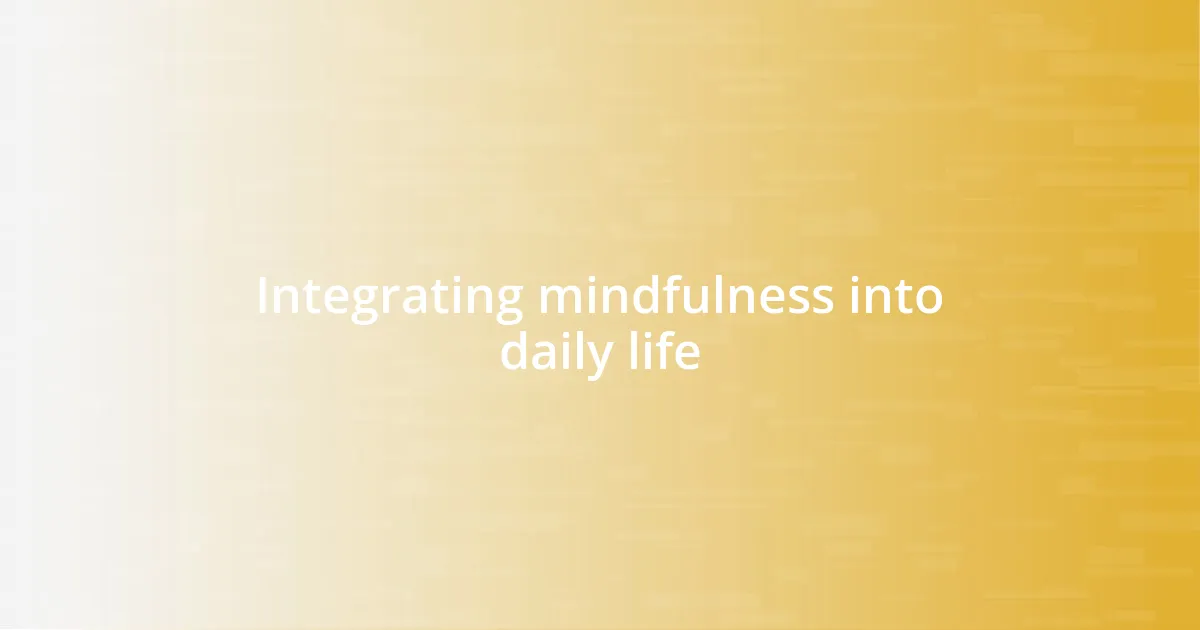
Integrating mindfulness into daily life
Integrating mindfulness into my daily life became a transformative practice that anchored my sobriety. I began with simple moments, like savoring my morning coffee. As I allowed the warmth of the cup to seep into my hands, I focused on the aroma and the taste, appreciating each sip. Have you ever paused to really enjoy a routine activity? This small act taught me to embrace the present, turning an ordinary moment into something remarkable.
During hectic days, I discovered the power of mindful pauses. Whether it was a brief break at work or waiting in line, I would take a moment to check in with myself. I’d ask, “What am I feeling right now?” This questioning turned my attention inward, fostering a deeper understanding of my emotions. I found it surprisingly comforting to acknowledge my anxiety or impatience without judgment. Each pause became an opportunity to reconnect with myself, reinforcing the idea that feelings are merely passing clouds, not permanent storms.
I also learned to weave mindfulness into my interactions with others. Instead of just going through the motions, I made a conscious effort to listen actively during conversations. I remember a heartwarming exchange with a friend where I set aside distractions, fully engaging in their stories. I could feel the connection deepening, a beautiful reminder of how being present can strengthen relationships. Isn’t it amazing how being mindful can transform not just our inner world, but also the way we connect with others? This practice illuminated paths in my recovery I never thought possible.
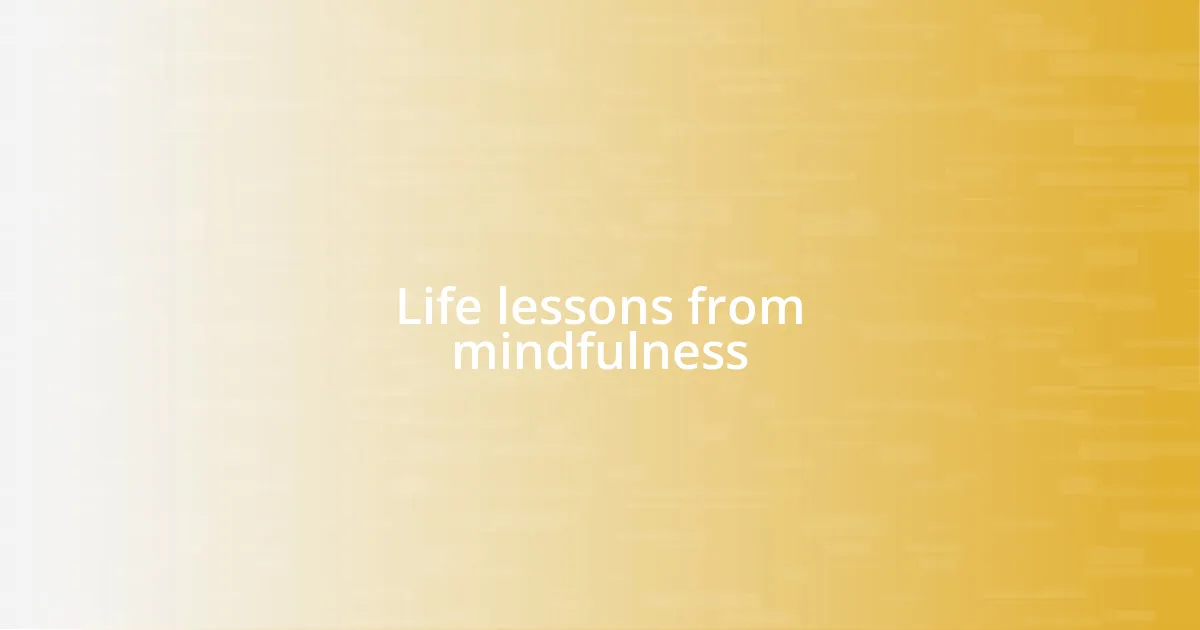
Life lessons from mindfulness
Mindfulness has taught me profound lessons about patience. There were days when I felt overwhelmed by cravings or self-doubt. In those moments, I’d remind myself that just like clouds pass in the sky, these feelings were temporary. I started to sit with my discomfort instead of running from it, which allowed me to gain clarity. Have you ever noticed how facing your feelings head-on can shift your perspective? I found strength in embracing the journey, rather than fixating on the destination.
Another lesson was the beauty of impermanence. I recall a quiet afternoon spent journaling, where I recorded my thoughts. Looking back, I realized how my feelings fluctuated day by day. Learning that nothing lasts forever—neither the bad moments nor the good—brought me a sense of freedom. This realization was empowering; it taught me that I could ride the waves of life with greater acceptance. Have you experienced a moment that felt heavy then faded into something lighter?
Ultimately, mindfulness revealed the importance of self-compassion. When setbacks occurred, like slipping into old thought patterns, I initially reacted with harsh criticism. Through my mindfulness practice, I learned to show myself kindness instead. I would gently remind myself, “It’s okay to stumble. What matters is how I get back up.” This shift in attitude has been magical, fostering an inner dialogue that supports my growth. Isn’t it remarkable how compassion can transform the way we approach our struggles? I’ve found it to be an essential part of my sobriety journey.
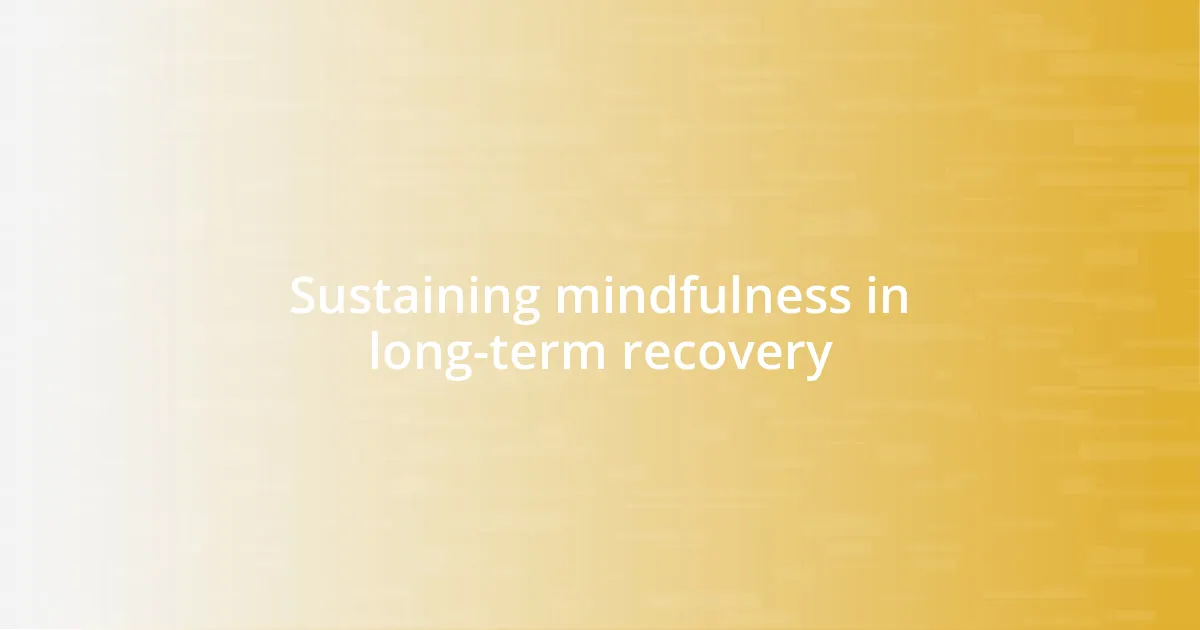
Sustaining mindfulness in long-term recovery
Sustaining mindfulness in long-term recovery is a continuous journey that requires intentional practice. I vividly remember a period when I felt my mindfulness slipping away. I decided to set a daily intention, something simple yet profound, like reminding myself to be present for even the smallest moments. How can something so small create such a big impact? For me, this self-commitment reinforced my focus, allowing me to rediscover mindfulness, especially during challenging times.
Another aspect I’ve learned is the importance of creating a supportive environment. I found that surrounding myself with mindful people invigorated my practice. I recall attending a local mindfulness group where we shared our experiences and insights. There’s something incredibly uplifting about connecting with others on a similar path. Have you ever found inspiration in hearing someone else’s story? Those conversations became reminders that I wasn’t alone, and they fueled my commitment to sustain my mindfulness journey.
Additionally, I’ve come to understand that mindfulness is not a one-size-fits-all practice. I experimented with various techniques, from meditation to mindful walking, and discovered what resonated with me. Sometimes, I still sit in quiet reflection, while other days, I find joy in moving meditation, like yoga. Have you noticed how trying different approaches keeps things fresh and engaging? This adaptability has become a cornerstone of my recovery, ensuring that mindfulness remains a vibrant part of my daily life.










